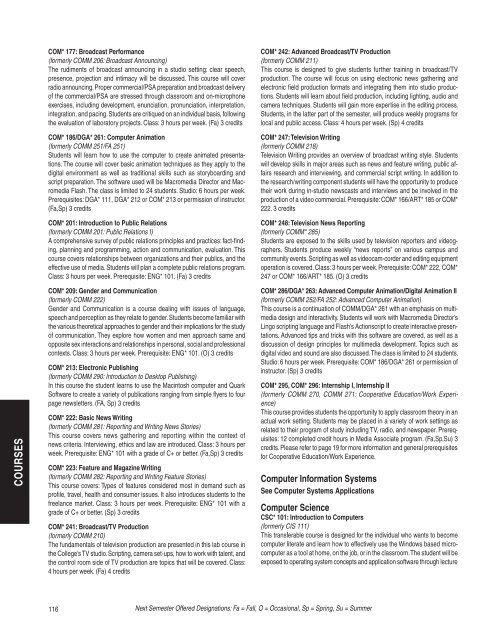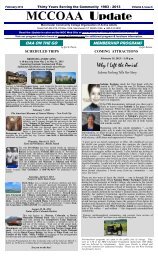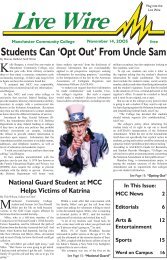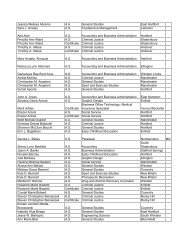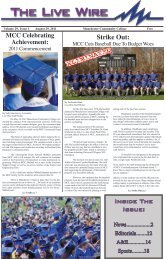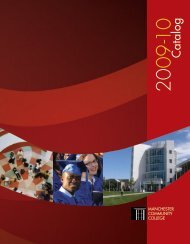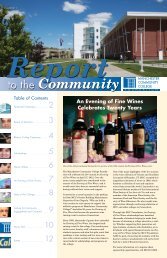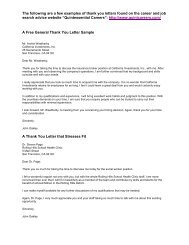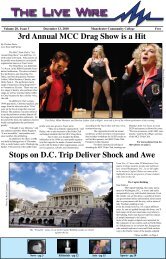Liberal Arts and Science - Manchester Community College ...
Liberal Arts and Science - Manchester Community College ...
Liberal Arts and Science - Manchester Community College ...
Create successful ePaper yourself
Turn your PDF publications into a flip-book with our unique Google optimized e-Paper software.
COURSES<br />
COM* 177: Broadcast Performance<br />
(formerly COMM 206: Broadcast Announcing)<br />
The rudiments of broadcast announcing in a studio setting: clear speech,<br />
presence, projection <strong>and</strong> intimacy will be discussed. This course will cover<br />
radio announcing. Proper commercial/PSA preparation <strong>and</strong> broadcast delivery<br />
of the commercial/PSA are stressed through classroom <strong>and</strong> on-microphone<br />
exercises, including development, enunciation, pronunciation, interpretation,<br />
integration, <strong>and</strong> pacing. Students are critiqued on an individual basis, following<br />
the evaluation of laboratory projects. Class: 3 hours per week. (Fa) 3 credits<br />
COM* 186/DGA* 261: Computer Animation<br />
(formerly COMM 251/FA 251)<br />
Students will learn how to use the computer to create animated presentations.<br />
The course will cover basic animation techniques as they apply to the<br />
digital environment as well as traditional skills such as storyboarding <strong>and</strong><br />
script preparation. The software used will be Macromedia Director <strong>and</strong> Macromedia<br />
Flash. The class is limited to 24 students. Studio: 6 hours per week.<br />
Prerequisites: DGA* 111, DGA* 212 or COM* 213 or permission of instructor.<br />
(Fa,Sp) 3 credits<br />
COM* 201: Introduction to Public Relations<br />
(formerly COMM 201: Public Relations I)<br />
A comprehensive survey of public relations principles <strong>and</strong> practices: fact-finding,<br />
planning <strong>and</strong> programming, action <strong>and</strong> communication, evaluation. This<br />
course covers relationships between organizations <strong>and</strong> their publics, <strong>and</strong> the<br />
effective use of media. Students will plan a complete public relations program.<br />
Class: 3 hours per week. Prerequisite: ENG* 101. (Fa) 3 credits<br />
COM* 209: Gender <strong>and</strong> Communication<br />
(formerly COMM 222)<br />
Gender <strong>and</strong> Communication is a course dealing with issues of language,<br />
speech <strong>and</strong> perception as they relate to gender. Students become familiar with<br />
the various theoretical approaches to gender <strong>and</strong> their implications for the study<br />
of communication. They explore how women <strong>and</strong> men approach same <strong>and</strong><br />
opposite sex interactions <strong>and</strong> relationships in personal, social <strong>and</strong> professional<br />
contexts. Class: 3 hours per week. Prerequisite: ENG* 101. (O) 3 credits<br />
COM* 213: Electronic Publishing<br />
(formerly COMM 290: Introduction to Desktop Publishing)<br />
In this course the student learns to use the Macintosh computer <strong>and</strong> Quark<br />
Software to create a variety of publications ranging from simple flyers to four<br />
page newsletters. (FA, Sp) 3 credits<br />
COM* 222: Basic News Writing<br />
(formerly COMM 281: Reporting <strong>and</strong> Writing News Stories)<br />
This course covers news gathering <strong>and</strong> reporting within the context of<br />
news criteria. Interviewing, ethics <strong>and</strong> law are introduced. Class: 3 hours per<br />
week. Prerequisite: ENG* 101 with a grade of C+ or better. (Fa,Sp) 3 credits<br />
COM* 223: Feature <strong>and</strong> Magazine Writing<br />
(formerly COMM 282: Reporting <strong>and</strong> Writing Feature Stories)<br />
This course covers: Types of features considered most in dem<strong>and</strong> such as<br />
profile, travel, health <strong>and</strong> consumer issues. It also introduces students to the<br />
freelance market. Class: 3 hours per week. Prerequisite: ENG* 101 with a<br />
grade of C+ or better. (Sp) 3 credits<br />
COM* 241: Broadcast/TV Production<br />
(formerly COMM 210)<br />
The fundamentals of television production are presented in this lab course in<br />
the <strong>College</strong>’s TV studio. Scripting, camera set-ups, how to work with talent, <strong>and</strong><br />
the control room side of TV production are topics that will be covered. Class:<br />
4 hours per week. (Fa) 4 credits<br />
116<br />
COM* 242: Advanced Broadcast/TV Production<br />
(formerly COMM 211)<br />
This course is designed to give students further training in broadcast/TV<br />
production. The course will focus on using electronic news gathering <strong>and</strong><br />
electronic field production formats <strong>and</strong> integrating them into studio productions.<br />
Students will learn about field production, including lighting, audio <strong>and</strong><br />
camera techniques. Students will gain more expertise in the editing process.<br />
Students, in the latter part of the semester, will produce weekly programs for<br />
local <strong>and</strong> public access. Class: 4 hours per week. (Sp) 4 credits<br />
COM* 247: Television Writing<br />
(formerly COMM 218)<br />
Television Writing provides an overview of broadcast writing style. Students<br />
will develop skills in major areas such as news <strong>and</strong> feature writing, public affairs<br />
research <strong>and</strong> interviewing, <strong>and</strong> commercial script writing. In addition to<br />
the research/writing component students will have the opportunity to produce<br />
their work during in-studio newscasts <strong>and</strong> interviews <strong>and</strong> be involved in the<br />
production of a video commercial. Prerequisite: COM* 166/ART* 185 or COM*<br />
222. 3 credits<br />
COM* 248: Television News Reporting<br />
(formerly COMM* 285)<br />
Students are exposed to the skills used by television reporters <strong>and</strong> videographers.<br />
Students produce weekly “news reports” on various campus <strong>and</strong><br />
community events. Scripting as well as videocam-corder <strong>and</strong> editing equipment<br />
operation is covered. Class: 3 hours per week. Prerequisite: COM* 222, COM*<br />
247 or COM* 166/ART* 185. (O) 3 credits<br />
COM* 286/DGA* 263: Advanced Computer Animation/Digital Animation II<br />
(formerly COMM 252/FA 252: Advanced Computer Animation)<br />
This course is a continuation of COMM/DGA* 261 with an emphasis on multimedia<br />
design <strong>and</strong> interactivity. Students will work with Macromedia Director’s<br />
Lingo scripting language <strong>and</strong> Flash’s Actionscript to create interactive presentations.<br />
Advanced tips <strong>and</strong> tricks with this software are covered, as well as a<br />
discussion of design principles for multimedia development. Topics such as<br />
digital video <strong>and</strong> sound are also discussed. The class is limited to 24 students.<br />
Studio: 6 hours per week. Prerequisite: COM* 186/DGA* 261 or permission of<br />
instructor. (Sp) 3 credits<br />
COM* 295, COM* 296: Internship I, Internship II<br />
(formerly COMM 270, COMM 271: Cooperative Education/Work Experience)<br />
This course provides students the opportunity to apply classroom theory in an<br />
actual work setting. Students may be placed in a variety of work settings as<br />
related to their program of study including TV, radio, <strong>and</strong> newspaper. Prerequisites:<br />
12 completed credit hours in Media Associate program. (Fa,Sp,Su) 3<br />
credits. Please refer to page 19 for more information <strong>and</strong> general prerequisites<br />
for Cooperative Education/Work Experience.<br />
Computer Information Systems<br />
See Computer Systems Applications<br />
Computer <strong>Science</strong><br />
CSC* 101: Introduction to Computers<br />
(formerly CIS 111)<br />
This transferable course is designed for the individual who wants to become<br />
computer literate <strong>and</strong> learn how to effectively use the Windows based microcomputer<br />
as a tool at home, on the job, or in the classroom. The student will be<br />
exposed to operating system concepts <strong>and</strong> application software through lecture<br />
Next Semester Offered Designations: Fa = Fall, O = Occasional, Sp = Spring, Su = Summer


